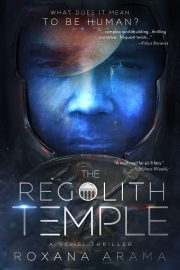Spec-Fic and Podcasting: Earbuds vs. Books, Part 2
by Travis Heermann
This post concludes “Spec-Fic and Podcasting: Earbuds vs. Books.” Part One can be found here.
 Podcasting and Speculative Fiction
Podcasting and Speculative Fiction
Aside from authors podcasting their novels, the medium was either the starting point or an outlet for online magazines like Escape Pod, Podcastle, Pseudopod, The Drabblecast, Strange Horizons, Beneath Ceaseless Skies, Lightspeed, Clarkesworld, and others. The sheer number of listeners has caught the notice of the spec-fic industry.
Both long and short form audio fiction seem to be thriving, but does the medium better suit itself toward long or short form fiction? According to Lafferty, it can work equally well for both. “Long form serials create a relationship with an audience, dying to know what the next part is about. But I think short stories are bite-sized bits of pleasure for the listener, and not as many people talk about ‘the death of the short story’ as they once did.” She admits she is biased, but believes that podcasting has helped revive the short story. “A lot of people who listen to [Escape Pod] weren’t even aware of the short story market, and I think they’ve found the print mags through mentioning during our shows.”
Podcasting and a Writing Career
So what might be the value of podcasting for new and established speculative fiction writers? Is it about exposure? Self-publishing? Monetizing the work? Creativity for its own sake?
Lafferty and other podcasters say that podcasting is valuable for creating relationships with an audience. “The audience hears your voice and cares about you, and what happens to you, and will root for you. They love to hear your voice telling stories, and they love to hear that you’ve sold this book they’re really into. I would not have the audience I have now if not for podcasting, that much is sure.”
Anyone going into podcasting should be aware, however, that it is not a magic bullet. Even podcasters as successful as Lafferty, there have been disappointments, the biggest of which was her Afterlife series of novels. “When it was podcast-only, it was a hands-down fan favorite of all my work, and had an amazing Kickstarter campaign for monetary support. However, it failed to sell to publishers and it failed to sell as a self-published e-book. I’m honestly flabbergasted, and it was a cold realization when I trunked it with regards to traditional publishing, and just left the e-books to get me a bit of spending money from time to time.”
From this writer’s perspective, podcasting two novels, both of which have gotten good reviews, has not translated into higher sales of the published versions or enough donations to cover the cost of equipment, despite more than 10,000 listeners.
Podcasting can also hamper writers’ efforts by becoming “dangerous distraction from actually writing,” Lafferty says. “Recording and editing and posting and spreading the word all take a LOT of time, and a writer often finds her writing slowing down while she’s actively podcasting. The only time this isn’t true is if fan response drives you to create more, naturally.”
Lafferty and other podcasters such as J. C. Hutchins, Scott Sigler received boosts to their early writing careers, but is podcasting still a viable way for wannabe fiction writers to launch their careers? Not by itself, according to Lafferty. “You’re shouting into a much more crowded room now. But podcasting plus other media, blogs, tumblr, etc., may help.”
Lafferty predicts that the “stubborn vets” will keep podcasting regardless of how the landscape changes, but cannot predict if more readers and listeners will embrace podcasting as a medium.
So what conclusions can be drawn? Does offering free content to rely on an ‘honor system’ devalue the work? What might this mean long-term for professional writers? Are we conditioning our audience to expect free (or almost free) content? How does the coming-of-age of e-books further complicate these questions?
One thing is clear. Even veteran podcasters cannot say.
•••
Freelance writer, poet, screenwriter, podcaster, poker player, biker, roustabout, Travis Heermann is an award-winning screenwriter and the author of the fantasy novels Heart of the Ronin and Rogues of the Black Fury published by E-Reads, plus the YA SF/horror novel The Wild Boys, forthcoming from Damnation Books. He’s churned out a metric ton of role-playing game content for AEG and EVE Online since 1999, and he has sold short fiction to anthologies and magazines such as Weird Tales, Cemetery Dance, and others. He taught English in Japan for three years, where he stood out like a space alien with his head on fire, but he now lives in much larger world than before. He’s camped out in the mountains, writing and scheming and dreaming of a NYT best-seller and a seat in the World Series of Poker. For more information, check out his website or blog.


